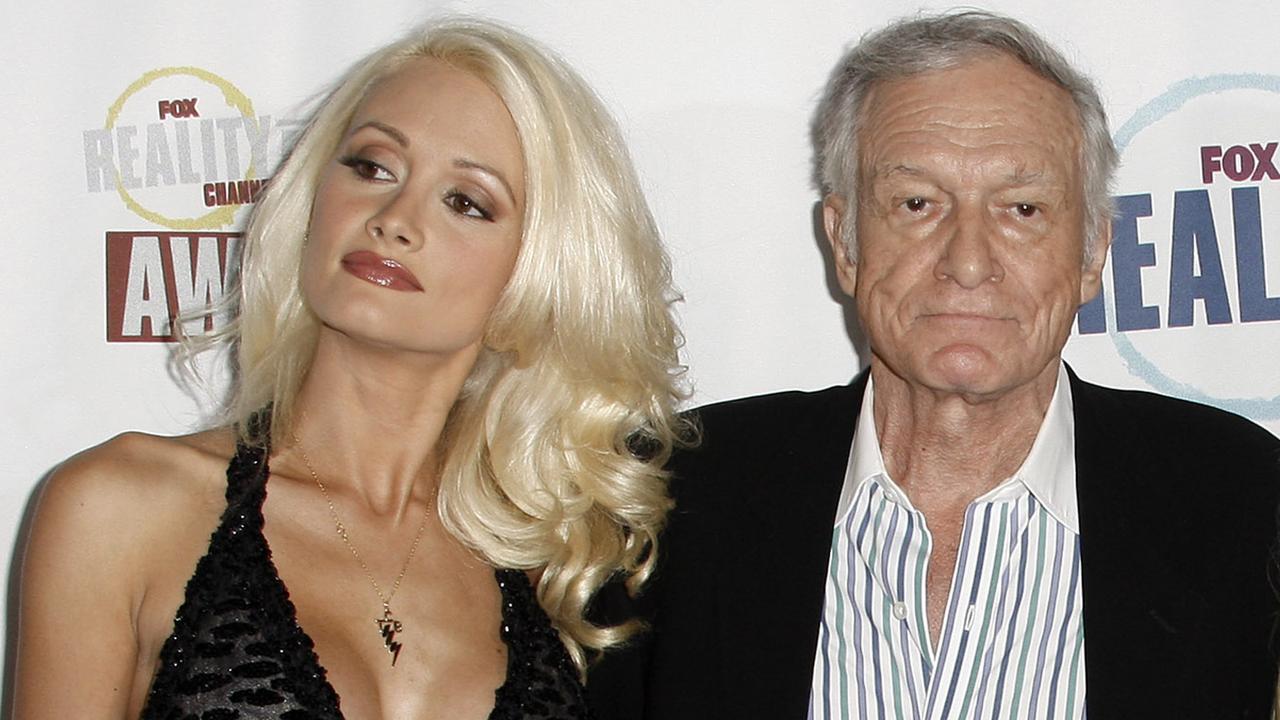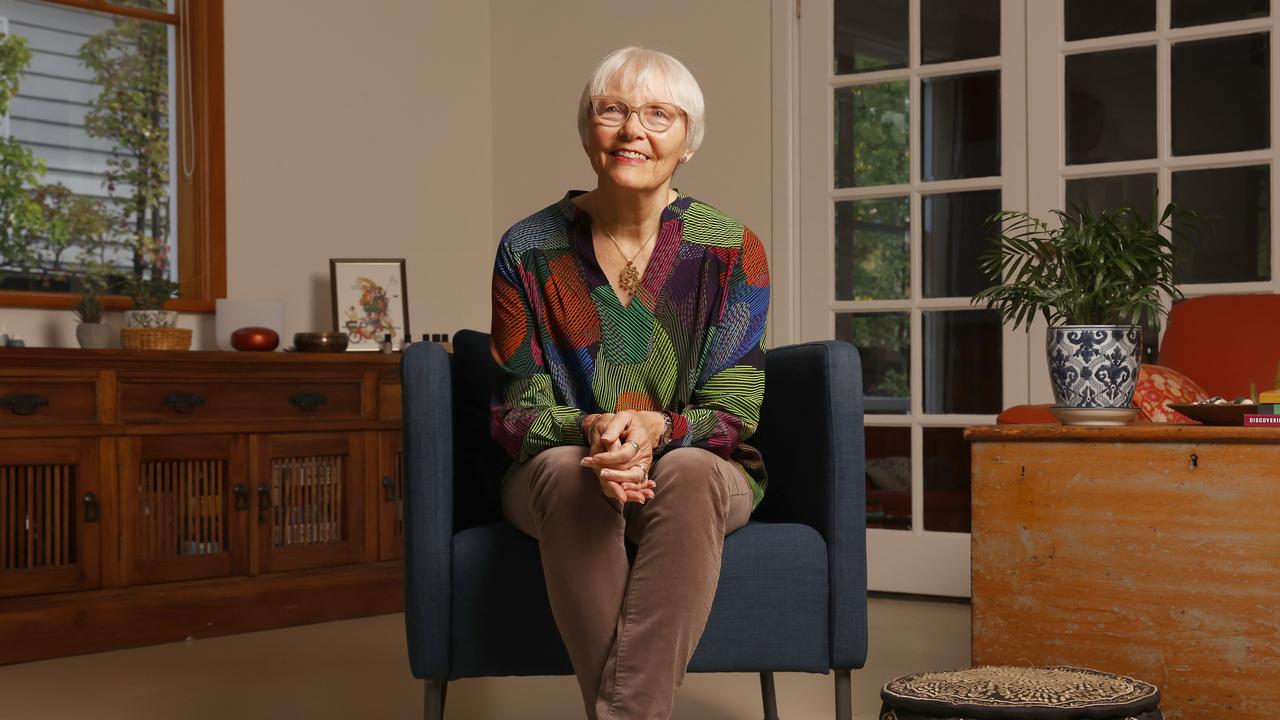Change is in the airwaves in Tasmania, now embracing the flourishing queer community
Grace Garde is happily at home in Tasmania – once known as being one of the most homophobic states in the nation — but now a leader in recognising diversity and a growing LGBTIQA+ tourism industry.
Lifestyle
Don't miss out on the headlines from Lifestyle. Followed categories will be added to My News.
HOBART radio producer Grace Garde says she wants to use her platform to create acceptance and visibility for the queer community.
The producer of Hit100.9’s breakfast show with Jimmy and Nath speaks openly on air about her same sex relationship.
“The Australian media landscape in radio could be more diverse,” she said.
“I think there are so many stories and points of view and it’s a shame that not enough of those people have platforms.
“I’d love to think maybe there are some queer kids out there listening to their favourite radio show and hear a story from me about my girlfriend and that might normalise it.
“I think every voice helps and every story helps. It’s important for any diverse relationship to be more visible.”
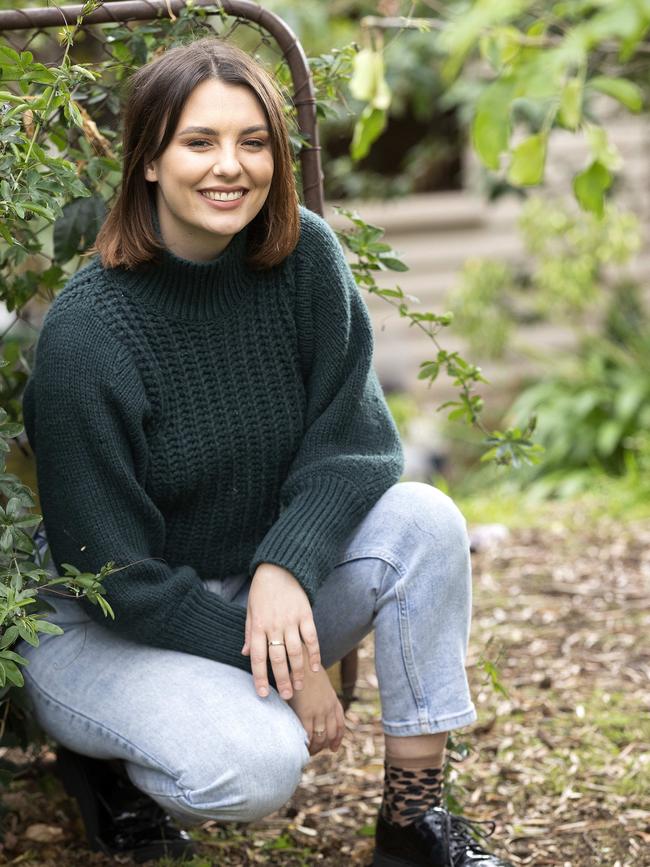
Moving to Hobart from Sydney two years ago with her partner, tech recruiter Diana Kalkoul, Grace said she’s started to notice a shift in Tasmania.
Once known as ‘bigot’s island’ Tasmania is slowly transforming into one of the more welcoming places for the LGBTIQA+ community.
With a tourism industry which proudly pioneered rainbow accreditation, an emerging nightlife featuring drag bingo and regular club events, and safe spaces such as cafes and sporting clubs.
Tasmania imposed some of the harshest penalties in the Western world for homosexual activity until 1997, when it was the last Australian jurisdiction to decriminalise homosexuality.
In the early nineties Ulverstone was dubbed Australia’s most homophobic town.
But Grace, 25, thinks times have changed and Tasmania is on the precipice of a cultural revolution, particularly for the queer community.
Recognising the need for diversity and to create opportunities for LGBTIQA+ performers Diana created a new event, Nasty Party.
“Creating a space driven by queer brown people and persons of colour gives it a different cultural feel and a vibrancy that you don’t get a lot of in Hobart.”
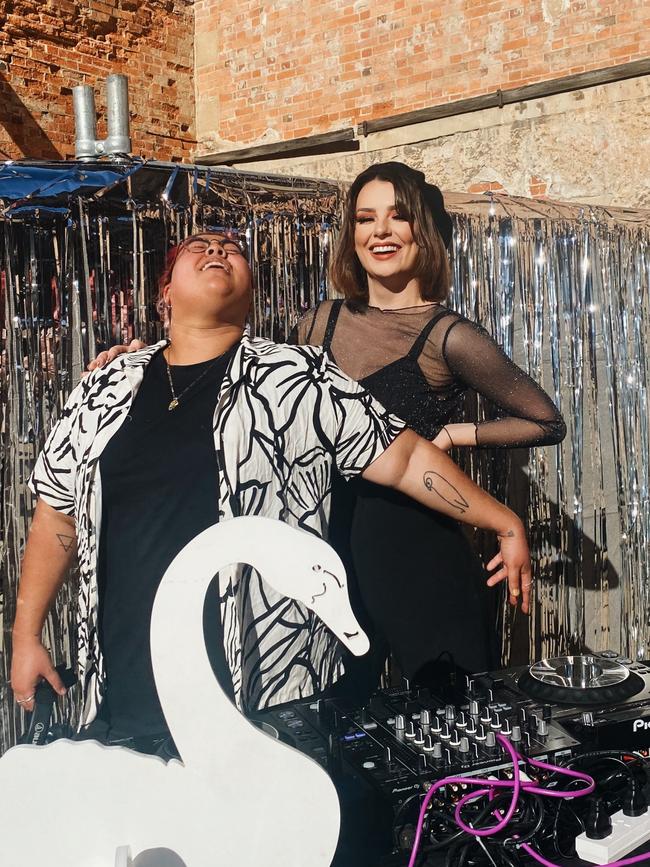
The couple have been together four years and have three chickens, two cats and a dog, Bailey.
They own a heritage house in Lutana, which has been stylishly refurbished and features a large garden brimming with fruit trees and veggies.
“We’ve only been here two years but already it feels like home,” Grace said.
“We have this home and we’ve filled it with the things we love and the animals we love and we wouldn’t want to be anywhere else.”
For Grace, discussing her sexuality on air was a no-brainer.
“I’ve been very fortunate that my work has never had an issue about me talking about being in a same sex relationship.
“At jobs I’ve been at in the past I’ve been asked not to speak about my partner on air, which was really difficult.
“They came to it from a position of ‘we’re trying to protect you’, but that’s my decision to make.
“I think it means more to people out there to hear me talking openly about having a female partner.
“Jimmy and Nath are super accepting. It wasn’t even a conversation about how I bring this up and when I bring this up, it was just so normal. It was refreshing.”
Diana said she was proud of her partner’s openness.
“Grace has been such a positive figure in that space.
“I think sometimes people get an image of what they think someone in a same sex relationship should look like and that’s not always the case.”
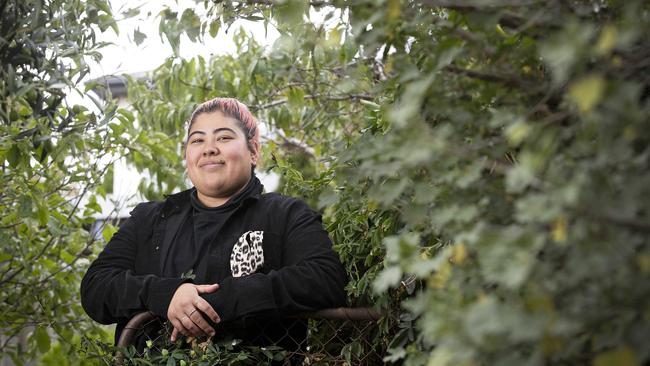
Grace said she aims to confront stereotypes.
“Nothing I do is especially challenging but if one person looks at me and goes ‘I wouldn’t of thought she was gay’ then that’s cool.
“I’m white, I’m cisgender, I’m relatively straight passing so I feel like I have this immense privilege that I really need to use to my advantage.
“I’m also lucky that I have this platform, not many people have that platform where they can reach so many people every day.
“Something that is really front of mind to me is to try and do my best to share that platform with people that need to be heard or have stories to tell.
“It’s not something I get right all the time but it’s something I’m working towards and something I want to be a bigger focus as I go further into my radio career.
“I’m only three years into that career so I feel like I’m still fresh and still learning but that’s definitely important to me.”
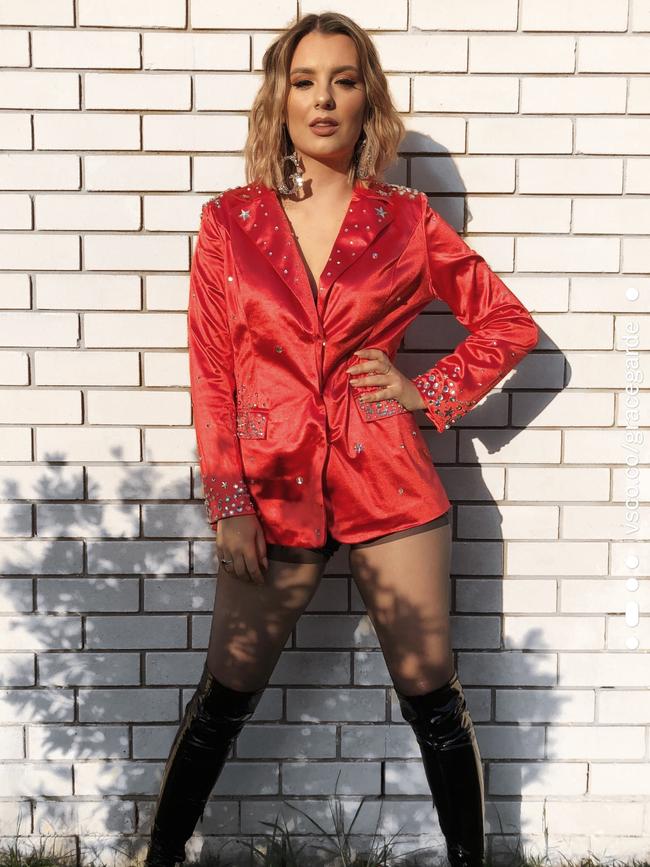
Grace has also spoken candidly on air about her mental health challenges.
“I’ve been taking antidepressants since I was 17 or 18 and it’s something that’s such a big part of my life and me functioning the way I am. And it’s something I’m truly not ashamed of.
“I know that that’s an easy thing for me to say but a lot of people have shame around taking that medication and there are still people that don’t understand the necessity of anti-depressants or anti-anxiety medication to function.
“Being a part of the conversation to normalise things like that or going to see a psychologist or being upfront about when you are or aren’t ok, that’s a really little thing for me to do and it doesn’t bother me but I hope it might change somebody else’s opinion.
“The thing I love about working with the boys is that they can take something which might be an awkward conversation and make it feel like you’re just sitting down with a group of friends having a casual chat.
“It doesn’t feel uncomfortable and they’re good at injecting humour into things so it’s more palatable for the everyday listener.
“It’s a good way to take those important messages and make them accessible to someone who might not of thought about mental health or thought about seeing a psychologist but it’s something they would benefit from.”
Grace said that as a producer she answers the phones and responds to social media messages and has been touched by some of the responses from those reaching out to thank them for those honest conversations and how important it was for them to hear it.
“It is really rewarding to hear from those people. It’s not why I do it but it’s a nice little perk.”
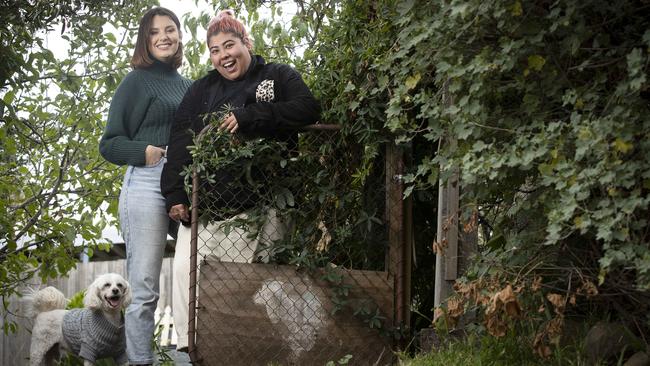
Diana, 31, works for DuckDuckGo, the alternative search browser to Google, as well as being a talented DJ.
“I started DJing at a hole in the wall club in Sydney and from there venues got bigger and bigger and I started doing launches and bigger parties.
“Coming to Hobart has been challenging because there still aren’t that many venues to play at and there are a lot of DJs, most of them quite established.
“It’s hard because the way you become a DJ is getting in front of people doing live gigs, but how do you become a great DJ without the opportunity to do that?”
Seeing this void Diana started the Nasty Party at Alter in Hobart with Priya Vunaki to give up and coming artists and performers a stage.
The first party in March sold out quickly.
The event featured a First Nations artist in their first ever performance as a drag queen.
“Unfortunately recently they were targeted and gay bashed in an alleyway in Hobart,” Diana said.
“So for them to come out and get on stage and perform was an amazing thing for them to do in the scene and to give them a space to do it where they felt comfortable.”
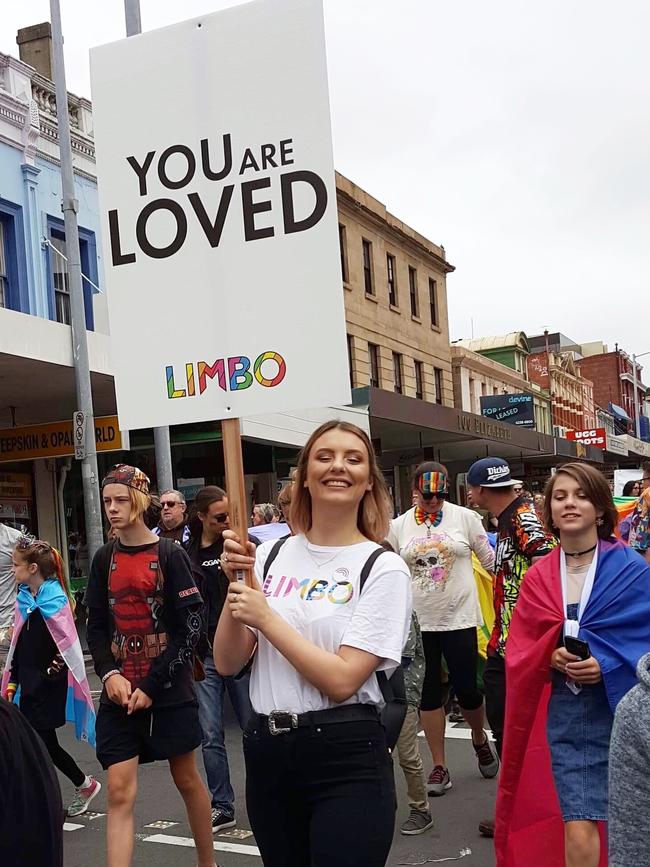
Diana said Nasty Party was about creating an alternative space and was driven by persons of colour from the queer community.
She is currently working on some pop-up events that are a bit more social focused, rather than alcohol fuelled.
“One is going to be in Launceston so that they’re a bit more spread across the state.”
Turning people away from the first sold out event was disappointing, Diana said, especially as they were striving for inclusion.
She says the COVID restrictions are currently hindering nightlife.
“The government has to let businesses thrive and survive. These places are not going to survive or run events because they can’t get the capacity to make it viable.
“It’s a struggle because it’s hard enough for venues to run the parties so individuals who want to put on cultural events targeted towards specific groups are disadvantaged.
“There are TV shows like Ru Paul’s Drag Race that are promoting this but these performers need a space they can hone their craft in front of an audience.
“We should be encouraging artists and performers to hone their craft but with the capacity issues and venues not being willing put on events it disadvantages a community of creatives.”
Grace said Hobart lacked a consistent nightlife, particularly since the closure of Flamingos in its Liverpool St venue.
“Spending time in Sydney where there’s an event on every night of the week to come here where there’s Limbo every couple of months or Flamingos at High Alter on a Friday night.
“We’re seeing a few more events pop up like Pussay Poppins and Ana Thema have a drag bingo at Society and there’s a drag brunch.
“There is such a huge demand. So many of these drag trivia, drag bingo events are selling out within a few hours. Limbo sold out in seven or eight minutes recently.”
Diana plays basketball in the Bushrangers tournament, Australia’s first nationwide LGBTIQA+ league, which launched in Hobart last year and plays games weekly at Moonah.
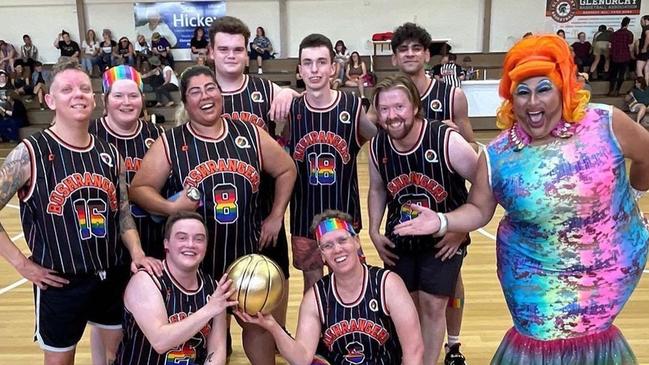
“It’s been great meeting people through that. People who don’t necessarily go out clubbing or out to social events but they will come to basketball.
“It’s been great to be part of, it’s a real melting pot. It’s a good way to foster community, we hang out after games.
“It’s grown and continues to grow. We started with four teams and now there’s seven or eight.”
Bushrangers Sporting Alliance President Stella Lesic founded the organisation in 2015 and said they are passionate about ensuring everyone has a safe place to come out and play.
With 400 participants across Australia and New Zealand, the club is the largest international queer community sporting club.
“Basketball has traditionally been a toxic place for people to be out and proud,” they said.
The club now has teams in every Australian state.
“It was an apprehensive move to expand into Tasmania because of the history of it not being inclusive and being the last to the table to decriminalise homosexuality.
“But knowing what we know now, it’s actually been one of our best states in terms of adopting the culture we’ve got at the club.
“Tasmania is our second biggest state with seven teams and we’ve applied for a grant to expand into Launceston.”
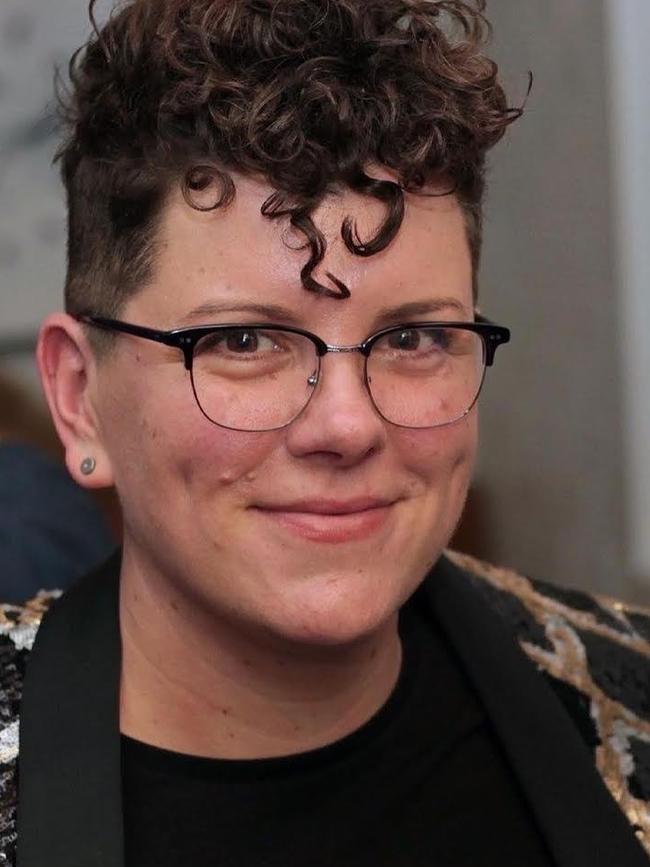
The club is also looking to add a roller skating team, the Rangers Rollers.
“Tasmania will be the natural progression for that because we’ve already got a relationship with the Convict City Rollers (Tasmania’s largest roller derby team).”
Stella said creating the team was about more than sport.
“All of my social interaction with the community was at a bar. I love getting on the beers but not all the time. So that’s something that’s stuck with us as one of the core cultural concepts.”
Stella said trans inclusion was a big part of the club as teams were traditionally part of a binary gendered competition.
“So people on the steps to gender affirmation or if they’re non-binary or they don’t know where they sit, they can join the team and not have to worry about it and they’ll be accepted.
“It’s been important for transgender or gender diverse people to have a safe space to play basketball.
“There’s a thin veneer of sport, what it’s really about is community and connection and feeling valued.
“Sport has been done incorrectly for a very long time in the space of inclusion.”
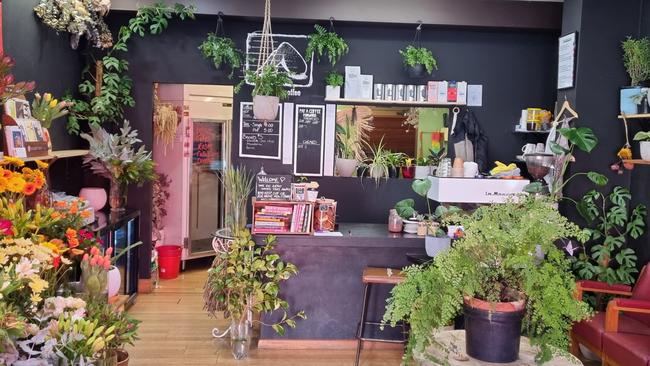
Jack O’Toole is co-owner of the Hairy Legs cafe, a safe space for the LGBTIQA+ community which opened in Sandy Bay about two months ago.
“All of my friend groups and the community had been crying out for a space during the day that doesn’t rely on alcohol to socialise, especially in the queer community,” he said.
“We’ve had a lot of people come in, especially people with anxiety issues, and say they feel really relaxed and safe and happy.”
Hairy Legs operates as a part florist, part cafe serving coffee and snacks.
“It’s almost like you’re walking into your best friend’s lounge room and you can sit down on the couch and there’s flowers and plants everywhere. We have good tunes and good vibes.”
The rainbow flag is proudly displayed at the venue, which has an emphasis on zero waste.
Jack has been performing in drag as Ana Thema for three years.
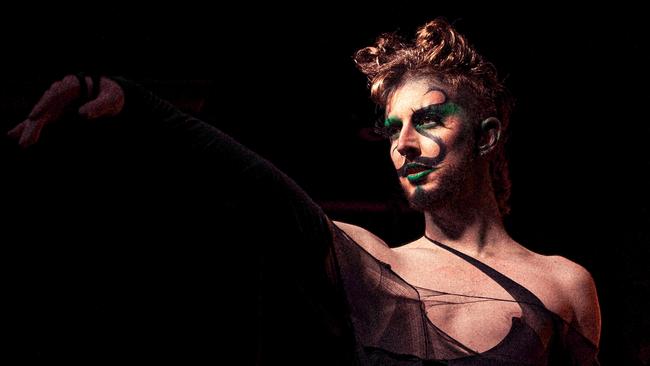
“I do bingo and perform at the club, at Flamingos.
“I love it because it’s about my personal expression. I’m out there having fun, expressing my own identity. It’s a creative outlet.
“There’s more and more places getting on board with it. I perform at Society in Salamanca and recently did a brunch at Boodle Beasley in North Hobart.
“There’s another brunch on Mother's Day.
“It’s good to see more wholesome things happening rather than alcohol fuelled parties.”
Tourism Industry Council Tasmania CEO Luke Martin said his organisation pioneered Rainbow Accreditation for LGBTIQA+ friendly tourism operations and are the only state to implement it.
Hundreds of businesses around Tasmania have achieved the accreditation vowing to treat all people in the same non-discriminatory manner and provide a safe and comfortable environment.
“We’ve taken a leadership role in that space and it’s something Rodney (Croome, who campaigned to decriminalise homosexuality in Tasmania and was a founder of Australian Marriage Equality) is very passionate about.
“It’s a hangover from having the reputation of being the bigoted island.
“It came in about 15 years after homosexuality was decriminalisation and it forces operators to think about how they can be welcoming as well as applying the Antidiscrimination Act.”
If this story has raised any issues for you contact Beyond Blue on 1300 224636

